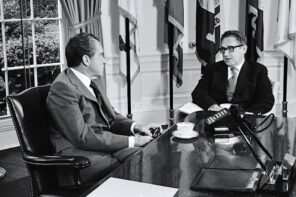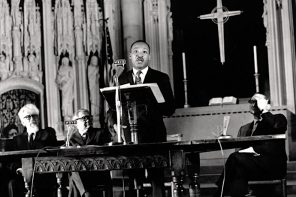Several paragraphs into the remarkable, front-page New York Times obituary of Robert McNamara, architect of the Vietnam War, the author Tim Weiner inserted the following description of the former defense secretary in his final years:
By then he wore the expression of a haunted man. He could be seen in the streets of Washington—stooped, his shirttail flapping in the wind—walking to and from his office a few blocks from the White House, wearing frayed running shoes and a thousand-yard stare.
That image itself is haunting. The man who sent so many young men to an early grave, not to mention the millions of civilian casualties, himself lived to the age of 93, reduced in his later years to shuffling along the streets of Washington like a specter. If you believe, as I do, in a Supreme Being and in divine providence, it’s difficult not to see a kind of cruel justice embedded somewhere in that image. Rather than living out his allotted threescore and ten, the man who, more than anyone else, was responsible for the quagmire of Vietnam was forced to live with his mistakes and with his regret for a very long time.
Somehow the words of a Vietnam-era protest song come to mind: “When will they ever learn?”
I don’t mean here to pile it on; my theology also tells me that we are, all of us, flawed beings in need of redemption. And it is certainly the case that McNamara was not the only person responsible for that misguided war. Presidential culpability extends, without interruption, from Dwight Eisenhower through Richard Nixon, with Lyndon Johnson bearing a massive share of the blame for escalating the war far beyond the realm of sanity. And let’s not forget the responsibility of ordinary Americans for failing to halt it, for electing Nixon in 1968 and reelecting him four years later, long after the folly of Vietnam had become apparent. (Henry Kissinger, by the way, if I calculate correctly, is 86.)
Still, McNamara stands out as a singular figure. “Every quantitative measurement we have shows we are winning this war,” the man who was then John F. Kennedy’s defense secretary announced confidently following his visit to South Vietnam in 1962. Two years later, when Senator Wayne Morse of Oregon referred to Vietnam as “McNamara’s War,” the secretary of defense shot back: “I am pleased to be identified with it and do whatever I can to win it.” McNamara, to his credit, began to have doubts by 1966, telling Johnson a year later that it was time to cut our losses and leave. Johnson dismissed him.
After a stint as head of the World Bank, McNamara published his own misgivings about Vietnam, In Retrospect: The Tragedy and Lessons of Vietnam, a confession that many believed was too little, too late. McNamara expanded his public contrition in the 2003 documentary The Fog of War, as George W. Bush was gearing up for the invasion of Iraq. “I do not believe that we should ever apply that economic, political, and military power unilaterally. If we had followed that rule in Vietnam, we wouldn’t have been there,” McNamara said. “If we can’t persuade nations with comparable values of the merit of our cause, we’d better reexamine our reasoning.”
Those familiar with Washington know that the Vietnam War Memorial is not much more than a stone’s throw (or a hand grenade’s toss) from the White House. I wonder if, as Robert McNamara shambled through the streets of Washington in his final years, back and forth to his office, he ever took a detour to the Vietnam Memorial, under cover of darkness perhaps. And I wonder if he stopped, like millions of visitors over the years, to trace his fingers over the names of a soldier or two who died in the faraway jungles of Southeast Asia, names etched for eternity into the black granite. And if he did, I wonder what went through the mind of the haunted man with the “thousand-yard stare.”
When will they ever learn?



